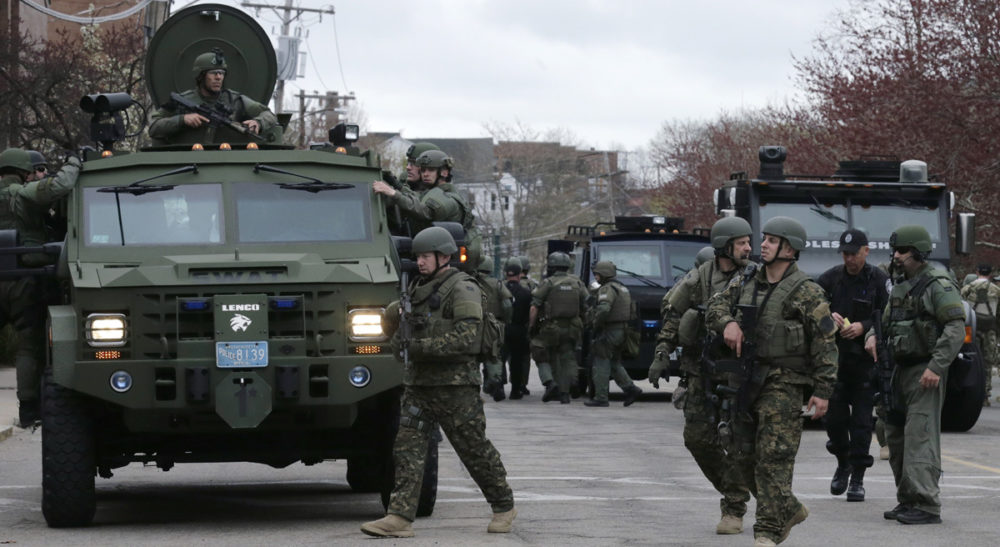Advertisement
Run Amok? Military Tactics And Secrecy In America's Police Forces

In late May, 2-year-old Bou Bou Phonesavanh was asleep in his playpen, his parents slumbering nearby, when heavily armed SWAT police burst into the room and threw a flash-bang grenade. The grenade landed in Bou Bou's playpen and exploded into the baby's chest, leaving him with brain damage, extreme burns, a collapsed lung and a disfigured face. His mother describes what happened next:
"After breaking down the door, throwing my husband to the ground and screaming at my children, the officers — armed with M16s — filed through the house like they were playing war. They searched for drugs and never found any.
I heard my baby wailing and asked one of the officers to let me hold him. He screamed at me to sit down and shut up and blocked my view, so I couldn't see my son. I could see a singed crib. And I could see a pool of blood. The officers yelled at me to calm down and told me my son was fine, that he’d just lost a tooth. It was only hours later when they finally let us drive to the hospital that we found out Bou Bou was in the intensive burn unit and that he’d been placed into a medically induced coma."
The grenade landed in Bou Bou's playpen and exploded into the baby's chest, leaving him with brain damage, extreme burns, a collapsed lung and a disfigured face.
It turned out the SWAT team was looking for a man — Bou Bou's father’s nephew — who wasn't at the house, and didn't even live there. According to law enforcement, earlier in the day, a police informant had purchased a small amount of drugs from him at the address. That was enough for police to obtain a no-knock warrant to raid the family home with extreme force. The day following the raid, police arrested their suspect somewhere else in town — in the street and without incident.
Baby Bou Bou will have a long road to recovery. Tragically, the SWAT raid that nearly killed him is hardly unique. An ACLU report published on June 24, 2014 shows that the vast majority of SWAT deployments it examined nationwide were related to drug investigations. Only 7 percent of the 800 militarized police operations the ACLU studied were executed in hostage, barricade and active shooter situations. Of the 62 percent of raids related to drug crimes, an overwhelming majority targeted people and families of color.
Those metrics, when viewed alongside heart-wrenching, enraging stories like the one in Georgia with the Phonesavanh family, should shock the conscience of our nation. As Bou Bou's mother said, “Every morning, I have to face the reality that my son is fighting for his life. It’s not clear whether he’ll live or die. All of this to find a small amount of drugs?”
In Massachusetts, we also know the pain of the militarized drug war. In only one of many examples of botched drug raids, the Framingham SWAT team killed African American grandfather of 12, Eurie Stamps, in a 2011 assault on his home. As with the raid on the Phonesavanhs, the police in Framingham were searching for young people suspected of dealing drugs. In the heat of the militarized raid, Eurie Stamps was shot to death by a police officer as the elderly man lay on his stomach, as instructed. The Framingham SWAT team has since been disbanded.
But while we can point to such horrifying anecdotes about the dangerous militarization of SWAT teams in our state, we do not have sufficient empirical information to demonstrate the depth and breadth of the problem. That's because a thick blue wall of police silence is obstructing the public’s access to timely and accurate data about SWAT deployments in the Bay State.
Some of that secrecy is due to the weakness of Massachusetts’s public records law, which allows police to charge exorbitant fees for compiling and disclosing records about their internal operations. But that isn't the only problem. When the ACLU of Massachusetts filed public records requests with the five Law Enforcement Councils that maintain regional SWAT squads in our state, we were told that these agencies, which are funded by taxpayer dollars and staffed by public police officials, are not subject to open records law. The LECs are private 501(c)3s, we were told, and therefore can keep secret their operating procedures, after action reports and other documents we requested.
We know we have a serious problem in the United States when police are routinely raiding our homes and deploying military weapons against us simply to look for some drugs.
That can’t be right. As my colleague, Jessie Rossman, said after we filed suit against the Northeastern Massachusetts LEC (NEMLEC), challenging this absurd position, "Either [NEMLEC] is a public entity subject to public records laws, or what it is doing is illegal." Police can't raid people's homes in the middle of the night, potentially committing violence and arresting people in the process, and then claim they are private actors immune from democratic transparency.
We know we have a serious problem in the United States when police are routinely raiding our homes and deploying military weapons against us simply to look for some drugs. But in order to roll back police militarization in Massachusetts, we need specific information about how and why police are executing these raids, against whom, and what results in the aftermath.
Transparency is the first step towards meaningful accountability and reform. Let's hope the court agrees that NEMLEC (and by extension, the other Law Enforcement Councils) must provide the public with that critical window into its operations. Only then can we begin the long process of reforming our public police departments to ensure that what happened to Eurie Stamps and Bou Bou Phonesavanh never happens again.

This piece was co-authored by Kade Crockford. Crockford directs the ACLU of Massachusetts's Technology for Liberty project.
Related: